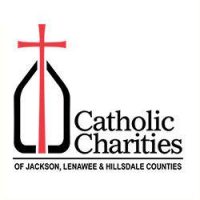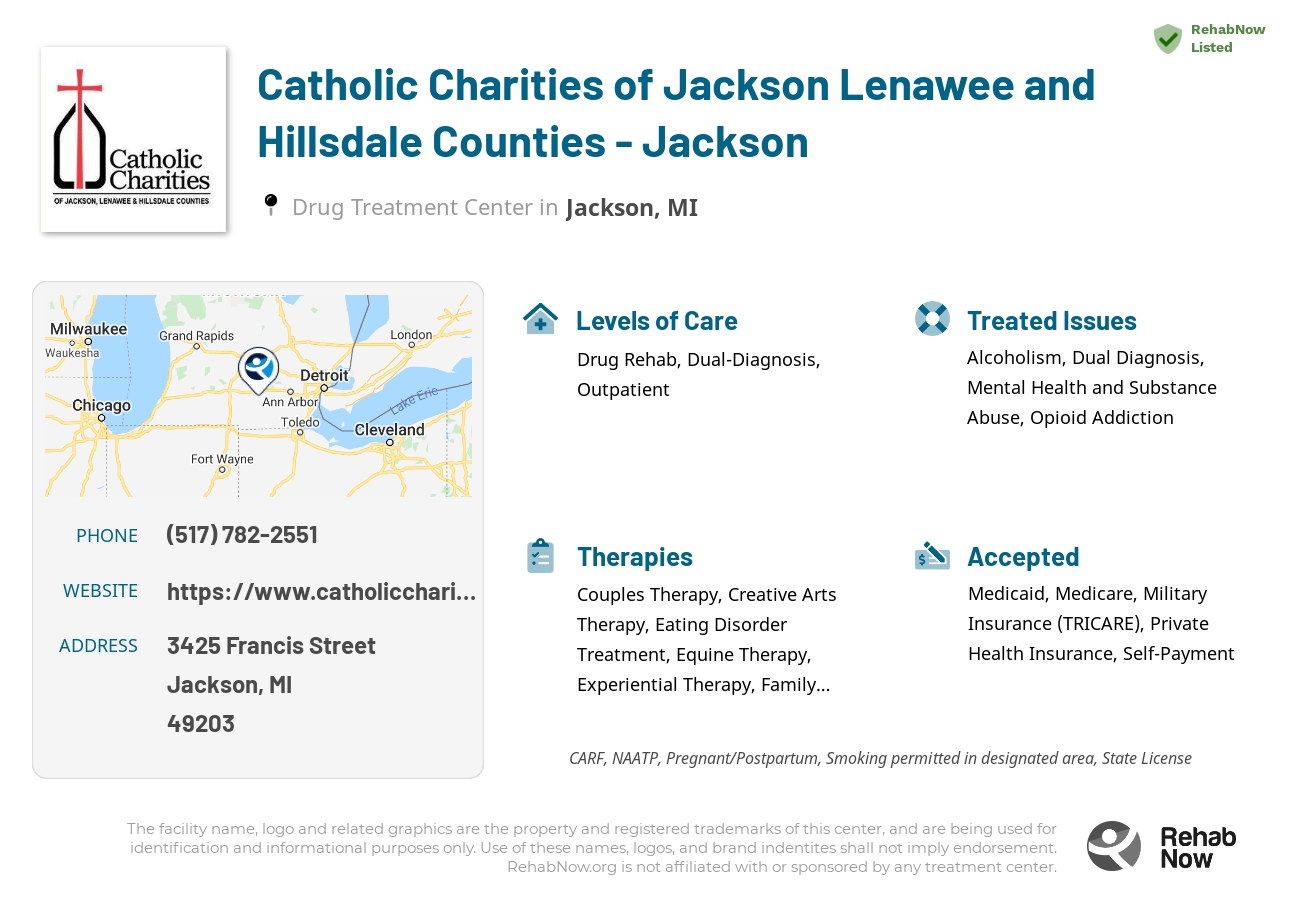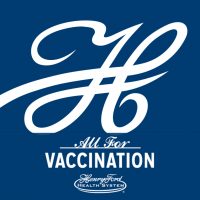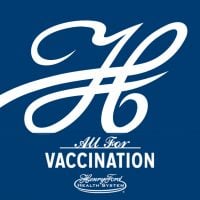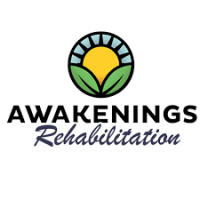Catholic Charities of Jackson Lenawee and Hillsdale Counties - Jackson
Drug Rehab Center in Jackson, Michigan
Catholic Charities of Jackson Lenawee and Hillsdale Counties-Jackson in Jackson, Michigan provides a wide range of services, including counseling and addiction treatment, with a team of experienced professionals to support individuals and families, offering comprehensive care and licensed by the State of Michigan and accredited by CARF.
About Catholic Charities of Jackson Lenawee and Hillsdale Counties - Jackson in Michigan
Catholic Charities of Jackson Lenawee and Hillsdale Counties - Jackson is an addiction treatment facility located in Jackson, Michigan. With a rich history dating back to its founding in 1958, the center aims to provide a supportive and compassionate environment for individuals struggling with various substance abuse issues. This long-standing organization offers drug rehab and dual-diagnosis treatment services, catering to those affected by alcoholism, opioid addiction, eating disorder, mental health issues, and drug addiction. The facility operates with the goal of helping individuals overcome their addictions and achieve long-term sobriety through evidence-based practices while fostering a sense of community and understanding.
Catholic Charities of Jackson Lenawee and Hillsdale Counties - Jackson excels in providing a wide range of addiction treatment services. In addition to offering drug rehab programs, they are dedicated to addressing comprehensive care needs. They prioritize treating individuals suffering from dual diagnosis conditions like mental health issues alongside substance abuse. Through individualized care plans tailored to meet each person's specific needs and an outpatient level of intensive care program, the center offers valuable support on the path to recovery. Here, individuals can access evidence-based treatment methods specially designed to target alcoholism, drug addiction(typically opioid), eating disorder challenges, as well as general substance abuse struggles in a compassionate setting. Considerations is given to different approaches including group therapy and counseling sessions promoting sustainable recovery outcomes. Private health insurances are accepted at this reputable facility associated with Catholic Charities aiming to make quality rehabilitation accessible for all those in need.
Genders
Ages
Modality
Additional
Conditions and Issues Treated
Opioid addiction treatment should be done in a medically supervised drug rehab. While taking opioids, users will typically use other substances to enhance the effects of opioids or to reduce the adverse effects of opioid use. Opioid addiction treatment will include detoxification and drug rehab counseling to help both the user and their loved ones learn how to live a successful sober lifestyle.
Treatments such as methadone, buprenorphine, and naltrexone are three medications that can help treat opioid addiction. These drugs work on the brain’s pleasure center and reduce cravings and the effects of illicit opioids such as heroin. These drugs can be either given orally or by injection. Individual drug rehab counseling sessions can be helpful to discuss any questions or concerns with the drug treatment program. This counseling will also help the user set goals for when they finish drug rehab.
Opioid addiction recovery is a long process. Many of the changes to the brain caused by opioid use cannot be undone, but with time and the proper treatment, a person can return to normal function. After detox, treatment will include drug rehab counseling and entering a halfway house or sober living community. Aftercare is critical to long-term recovery, as it helps the user avoid relapsing and entering back into drug rehab.
Levels of Care Offered
This center offers a variety of custom treatment tailored to individual recovery. Currently available are Drug Rehab, Dual-Diagnosis, Outpatient, with additional therapies available as listed below.
“Outpatient treatment is ideal for those who have a lower intensity addiction. It’s also suitable for those with a supportive environment and those on a tight budget.
Outpatient treatment can be considered the lowest intensity level of addiction treatment. It is ideal for early phase addiction or lower intensity addictions. It may involve weekly sessions instead of daily. Peer group support, 12-step programs, and individual counseling may still be used and anti-addiction medication.
Therapies & Programs
No single treatment works for all addicts; therefore, the goal of treatment and therapy should be to find what works best for each individual. Some people requiring addiction treatment may only need a few weeks of inpatient care. Others will require long-term residential care. Tolerance and withdrawal levels vary from person to person and thus affect the intensity of the treatment needed.
If an individualized approach to treatment and therapy is not offered, addicts may fail to reap benefits from their efforts. Professionals must customize plans according to their patient’s needs, limitations, and strengths. The goal of all forms of addiction treatment should be for addicts to find healthy ways to cope with their addiction and its underlying causes.
Couples therapy for drug addiction is a unique form of therapy that allows family members to work through the emotional issues of their loved one’s addiction together. Family members can support each other while learning how to cope with the addiction and encourage healthy changes.
Accordingly, couples therapy for drug addiction is designed for an addict and their significant other or spouse. The two will work with a therapist to learn how the addiction affects themselves and the relationship and how to break the negative patterns of behavior that may have developed.
Drug addiction can destroy a person’s life, as well as their family and friends. The loss of one’s ability to choose how to live and behave often leads the addict into depression, anger, guilt, and many emotional problems.
The therapies usually include siblings, children, and parents who are involved in their daily lives. These sessions are vital because they address past issues that may have hampered an addict’s or alcoholic’s recovery and provide support at a crucial time!
One of the most critical aspects of family therapy is helping addicts’ loved ones see their situation in a new light. It’s also one of the most challenging things a family can do when a loved one struggles with addiction or alcoholism.
Group therapy is held in a safe, controlled setting where patients can feel comfortable sharing their struggles and gaining perspective through shared conversations. It takes place in a group rather than one on one to prevent feelings of isolation or being unique in their situation while creating an environment for addicts at Catholic Charities of Jackson Lenawee and Hillsdale Counties - Jackson to develop fellowship, accountability, and support. Group therapy is an important tool in recovery that prevents cravings that prompt a return to active addiction.
This type of therapy involves the use of a variety of therapeutic techniques to help addicts recover from past traumas that might have triggered their substance abuse. During these sessions, therapists will work with the addict to address painful memories and learn how to cope effectively with stressors as they arise.
During these types of sessions, therapists will typically focus on three main goals:
- Identifying and expressing painful emotions associated with past traumas.
- Reducing the effects of stress on an addict’s life by developing more effective coping mechanisms.
- Developing healthy ways of thinking about stressful situations that can help addicts avoid substance abuse issues in the future.
This type of therapy is typically used in conjunction with other types of addiction treatment services. By identifying and dealing with the root cause of addiction, most addicts can overcome their cravings and prevent relapse once they leave rehab.
Many different types of addiction treatment services exist to help addicts safely get sober, but it’s important for recovering individuals to find a therapist or support group that will help them address the root cause of their addiction.
Patient Experience
Creative Arts
Creative arts therapy is a form of expressive therapy that uses painting, music, poetry, and other creative means to help those battling addiction. It is beneficial for patients to release negative feelings and emotions and explore how their thoughts and emotions play out through the creative process. Catholic Charities of Jackson Lenawee and Hillsdale Counties - Jackson in Jackson, MI, offers creative art therapy to help patients cope with addiction and its after-effects.
Experiential Therapy at Catholic Charities of Jackson Lenawee and Hillsdale Counties - Jackson
Experiential Therapy is used by drug treatment facilities to treat substance abuse. This treatment is clinically proven to help addicts in detoxification by allowing them to release emotions in a safe environment. The treatment process involves addicts painting their feelings and releasing them on a canvas.
One of the most popular forms of experiential therapy is known as LPE – Love, Peace, and Equilibrium. Amy Gumowitz developed this treatment in 1992. By implementing her philosophy of “reality therapy” into the treatment, Gumowitz’s results were outstanding. Once her success was validated by those she had been helping, she decided to open her treatment center. Although Gumowitz passed away in 2007, her contribution to the addiction recovery remains effective, and better yet, it is 100% self-sufficient.
Equine Therapy at Catholic Charities of Jackson Lenawee and Hillsdale Counties - Jackson in Michigan
Horses have a number of attributes that make them ideal for this type of therapy. For instance, they can help addicts work through their feelings in a safe environment while providing a nurturing support system that is free from judgment and criticism.
In these sessions, addicts interact with horses under the guidance of an equine therapy expert. Many recovering addicts find this type of therapy to be extremely beneficial because the horses provide unconditional love and support that can help addicts feel more comfortable discussing their deepest feelings.
In addition, the physical nature of this type of therapy provides a positive distraction from cravings and urges. This is especially important for recovering addicts who struggle with intense cravings that can quickly lead to relapse if they aren’t properly managed.
Payment Options Accepted
For specific insurance or payment methods please contact us.
Is your insurance accepted?
Ask an expert, call (888) 674-0062
Catholic Charities of Jackson Lenawee and Hillsdale Counties Associated Centers
Discover treatment facilities under the same provider.
Learn More About Catholic Charities of Jackson Lenawee and Hillsdale Counties Centers
Additional Details
Specifics, location, and helpful extra information.
Jackson, Michigan 49203 Phone Number(517) 782-2551 Meta DetailsUpdated November 25, 2023
Staff Verified
Catholic Charities of Jackson Lenawee and Hillsdale Counties - Jackson Patient Reviews
There are no reviews yet. Be the first one to write one.
Jackson, Michigan Addiction Information
Michigan has the second-highest rate of drug and alcohol abuse in the nation. Heroin is linked to more than 50% of the state's hepatitis C cases. Marijuana is the drug most often associated with crimes in Michigan, followed by methamphetamines. Opioids alone are responsible for almost 20% of all drug overdose deaths in Michigan.
In Jackson, Michigan, there are more than 40 deaths caused by drug overdoses in 2013. This adds up to about 15% of all the fatal injuries in the city. The total number of arrests for drug-related crimes in 2012 was just over 1,500. The most common drugs of abuse are heroin, LSD, marijuana, crack cocaine, and methamphetamine.
Treatment in Nearby Cities
- Owosso, MI (55.6 mi.)
- L'anse, MI (372.6 mi.)
- Tecumseh, MI (27.3 mi.)
- Farmington Hills, MI (56.3 mi.)
- Kincheloe, MI (280.5 mi.)
Centers near Catholic Charities of Jackson Lenawee and Hillsdale Counties - Jackson
The facility name, logo and brand are the property and registered trademarks of Catholic Charities of Jackson Lenawee and Hillsdale Counties - Jackson, and are being used for identification and informational purposes only. Use of these names, logos and brands shall not imply endorsement. RehabNow.org is not affiliated with or sponsored by Catholic Charities of Jackson Lenawee and Hillsdale Counties - Jackson.
